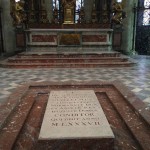
Today we began at Mont St. Michel, one of the most visited and photographed sights in the world.
Mont St. Michel is a monastery built in the 8th century on a rock off the coast of Normandy, France.
It is completely surrounded by water and is connected to land only by a causeway.
The monasteries were vital contributors to the Carolingian Renaissance because they were where manuscripts (books) were copied.
Although Charlemagne never learned to write (he could read), he recognized the importance of literacy and required each diocese to establish a school.
During the reign of Charlemagne, and for 650 years after, the fastest way to produce books was by copying manuscripts by hand. This was a job performed by monks in monasteries, and it was tedious work. It took a monk 2-3 months to copy a manuscript of average length.
The monks at Mont St. Michel copied such works as the Bible, commentaries on the Bible, Augustine, Plato, Seneca and Boethius. Monks at this and other monasteries not only helped facilitate the Carolingian Renaissance but they are the reason many such works have survived to this day. In fact, but but for Church and the Christian Byzantines there truly would have been a dark ages following the fall of the Roman Empire.

After a lunch at Mont St. Michel that for me included a Croque-Monsieur and a crepe (beurre sucre), we drove to Caen, France, to see the tomb of William the Conquerer (1028-1087). By his victory at the Battle of Hastings in 1066, William became king of England. His conquest is portrayed in the Bayeux Tapestry we saw two days ago.
William has additional significance for us because he was the father of Robert, Duke of Normandy. Robert was a leader in the First Crusade and fought with Godfrey de Bouillon at the Siege of Nicea and the Battle of Antioch. More about the First Crusade and Godfrey later.
Le controverse de l’addition
Our day came to a close at a restaurant in Bayeux. When it came time to pay the bill (“l’addition”), I tried to get the server’s attention. Cindy told me it is considered rude in France to waive your hand at a server, so I simply placed my credit card in the tray with the bill.
The server walked by several times and didn’t pick up the tray. So the next time she game by, I conspicuously–yet discretely–pushed the tray to the edge of the table. She didn’t stop.
The next time she came by I pushed the tray a little further out. This went on for about twenty more minutes, with me pushing the tray further out toward the edge of the table. Finally, with the tray teetering on the edge of the table I caught the server’s eyes and conspicuously looked down at the tray. Now I knew she had seen we were ready to pay and leave, but she still didn’t pick up the tray.
Next I placed the tray on top of the water bottle in the center of the table, but Cindy thought this was bad form, so instead I placed the tray on the floor in the isle between the tables where the sever had to walk. That drew a frown from Cindy, so I picked it up.
Cindy and Ann then suggested I just leave cash, but at this point it had become personal. To pay cash would be to let the server win and encourage her French indifference. A different strategy was needed.
I told Cindy I was going to hand the tray to the server the next time she walked by. By this time, Cindy was in full agreement. We had been waiting to pay now for nearly forty minutes and all three of us just wanted to get out of there and back to the hotel.
A few minutes later, our server reappeared and as she walked by our table I held out the tray directly in front of her. To our amazement, looking down and seeing the tray in my hand, she simply stepped to the side and walked around it, never even acknowledging me. I had heard of such stories but thought they were urban legend. Now I was in the middle of one.
I had had it now. I took the bill out of the tray, turned it over and told Cindy and Ann that I was going to write:
“Here is my address. Send me a bill. But you should know I am very busy and it may be a while before I get time to pay you.”
As I finished saying this, the server showed up over my right shoulder, grabbed the bill and my credit card out of the tray and finally rang us up.
Let me close by saying I hope this incident–“le controverse de l’addition” (the incident of the bill) as it has come to be known–does not cause you to form a bad opinion of the French. They have been very polite to us otherwise.
Tomorrow morning we go to Reims, and I understand Antonio Banderas–the driver, not the actor–will be driving us there. GS
